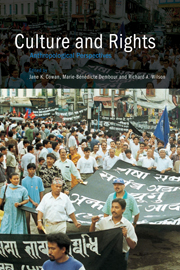Book contents
- Frontmatter
- Contents
- List of contributors
- Preface
- 1 Introduction
- Part I Setting universal rights
- Part II Claiming cultural rights
- 7 Ambiguities of an emancipatory discourse: the making of a Macedonian minority in Greece
- 8 From group rights to individual rights and back: Nepalese struggles over culture and equality
- 9 Advancing indigenous claims through the law: reflections on the Guatemalan peace process
- 10 Rights as the reward for simulated cultural sameness: the Innu in the Canadian colonial context
- Index
9 - Advancing indigenous claims through the law: reflections on the Guatemalan peace process
Published online by Cambridge University Press: 05 June 2012
- Frontmatter
- Contents
- List of contributors
- Preface
- 1 Introduction
- Part I Setting universal rights
- Part II Claiming cultural rights
- 7 Ambiguities of an emancipatory discourse: the making of a Macedonian minority in Greece
- 8 From group rights to individual rights and back: Nepalese struggles over culture and equality
- 9 Advancing indigenous claims through the law: reflections on the Guatemalan peace process
- 10 Rights as the reward for simulated cultural sameness: the Innu in the Canadian colonial context
- Index
Summary
Introduction
In December 1996 a negotiated peace settlement between insurgent and government forces in Guatemala brought to an end over three decades of armed conflict. Although this had not been fought over ethnic claims for autonomy or self-determination, the historical marginalization of, and discrimination against, the majority indigenous Maya population was one of the underlying causes of the war and remains one of the country's central political problems. After 1990 indigenous organizations began to emerge and lobby for greater participation and rights for indigenous people on the basis of ethnic entitlement. Supported by the UN and other international actors, such demands found expression within the framework of the negotiated settlement. The Agreement on the Identity and Rights of Indigenous Peoples, signed by the insurgent Unidad Revolucionaria Nacional Guatemalteca (URNG) and the Guatemalan government in March 1995, represents an official commitment to improving the political representation and socio-economic participation of indigenous peoples. However, this document, whilst seen to be representing indigenous demands ‘on the ground’, was at the same time shaped by the language of international human rights and multiculturalist discourses.
In this chapter we argue that recourse to legalistic strategies and discourses to strategically further the aims of indigenous movements shapes the ways their aspirations are represented. Indigenous identities in Guatemala are effectively being narrated or codified through dominant legal discourses, specifically those of international human rights law and multiculturalism.
- Type
- Chapter
- Information
- Culture and RightsAnthropological Perspectives, pp. 201 - 225Publisher: Cambridge University PressPrint publication year: 2001
- 49
- Cited by



